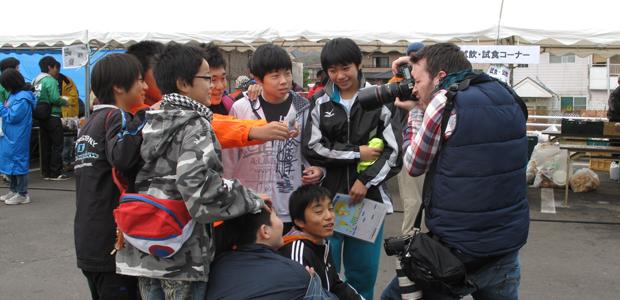Taking New Family Portraits in Japan After the Tsunami
Photohoku volunteer photographer Craig Watson (right) takes a photo of local children at the Yamamoto-cho town festival. (Photo: Junko Takahashi)
When a disaster hits your country, it's natural to want to help.
Yuko Yoshikawa, who runs a photo agency in Tokyo, felt that impulse in the months after a massive tsunami and earthquake devastated much of Japan's northeastern coast.
"I wanted to do something by photo," she said. "But I didn't know how to do it." Tsunami
Eventually she and one of her photographers, Brian Peterson, figured it out. On weekends they'd round up a group of professional photographers and head up the coast to small, damaged towns. There they'd offer locals the service they were best trained in, taking portraits. They offered their service for free.
They called themselves Photohoku. They give photos to the people of the Tohoku, which is the region of Japan where many people lost everything in the disaster, including their family photos.
We caught up with them at a town festival in Yamamoto-cho in Miyagi Prefecture. There were about a dozen or so photographers on hand, shuffling locals to an impromptu photo studio.
Some were a little self-conscious about getting portraits, including the Aota family, a mother and father with their toddler son. But Brian Peterson quickly put them at ease.
While he composed the shot, Peterson and the Aoto made small talk–half in simple English, half in Japanese. He's lived in Tokyo for eight years.
As Peterson works, his camera produces loud thunks and swipes.
It's not digital. Instead, he uses instant film, sort of like a Polaroid. You take a shot, then you wait a few minutes for it develop on the spot.
As we pass the time, Takuya Aota, the father, explains that he's a firefighter. He saw the damage in Yamamoto-cho up close. He crawled through the rubble to count bodies.
He believes Yamamoto-cho was forgotten quickly, even within Japan. Rumors spread, he said, that when politicians surveyed the damage by helicopter right after the disaster, they were napping.
So no matter how the photos turn out, he's just impressed to have anyone from Tokyo visit his town.
Once the Aota family gets a look at the photo, it's theirs to keep. It's standard operating protocol at Photohoku to hand over the single, hard copy of the photo to its subject. The photographers take nothing home.
Brian Peterson says this aspect of Photohoku is incredibly important, given how intense yet fleeting the media invasion was after the disaster.
"I think they felt at times like they [the disaster victims] were animals in a zoo maybe. And when they saw that the photos we were making, we were giving them this thing and walking away with nothing. All of a sudden they said, 'I want that.'"
Meanwhile, on a small patch of grass outside, another photographer was taking portraits of Katsushi Sakuma and his family. He's the principal at the local elementary school.
When the tsunami flooded my house, Sakuma said, it destroyed photos from different parts of my life. That included photos of himself as a child, of his own children, and his first days as a teacher.
Sakuma mostly keeps a serious countenance during the shoot. But then suddenly, a couple minutes in, he cracks a smile.
And later Brian tells me that brings to mind one of his first volunteer shoots. He was taking portraits of an old woman with her family at a temporary housing complex.
"At the moment that we took the photo they all burst into laughter because of something silly probably that I said," he said. "And the woman saw her photo … and she started crying. I'm almost crying just thinking about it. And she said I didn't think I would be able to see myself smile again."
